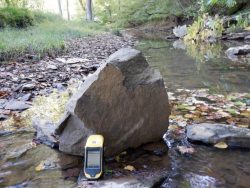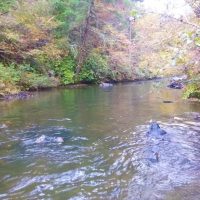 (Tyler County, WV) Antero Resources Corporation contracted EnviroScience, Inc. to perform an impact assessment, including a delineation and freshwater mussel survey to document potential impacts to the Elk Fork at the Margery Pad located in Tyler County, WV. The assessment included documenting the extent of impacts not previously proposed and determining disturbance limits. A delineation of aquatic resources, including streams and wetlands, was performed within the disturbance limit and a 150-foot buffer.
(Tyler County, WV) Antero Resources Corporation contracted EnviroScience, Inc. to perform an impact assessment, including a delineation and freshwater mussel survey to document potential impacts to the Elk Fork at the Margery Pad located in Tyler County, WV. The assessment included documenting the extent of impacts not previously proposed and determining disturbance limits. A delineation of aquatic resources, including streams and wetlands, was performed within the disturbance limit and a 150-foot buffer.
EnviroScience also conducted a qualitative freshwater mussel survey on Elk Fork at the project location to determine the impact of the incidental fill on potential resident freshwater mussels. An EnviroScience certified malacologist efficiently coordinated the mussel survey plan, fieldwork, and report with Antero and the West Virginia Department of Natural Resources (WVDNR) following current West Virginia state protocols. Based on the qualitative mussel survey results, it was determined that the project’s incidental fill did not impact native freshwater mussel populations in Elk Fork at the project location.
After completing the field surveys, EnviroScience coordinated with the U.S. Army Corps of Engineers, WVDNR, and the WVDNR Office of Land and Stream to verify that no permitting would be required for the minor unanticipated impacts. A permit application for work within the designated 100-year floodplain was submitted to and approved by the Tyler County, WV floodplain administrator.
EnviroScience maintains a hearty staff of malacologists who are all permitted to conduct freshwater mussel surveys. Our experience includes endangered mussel surveys, impact assessments, translocations, mitigation design, biological assessments, expert consultation, and experimental lab and field research on mussels. Further, EnviroScience is one of the few biological firms in the country that is a general member of the Association of Diving Contractors International (ADCI) and offers full-service commercial diving services. Our diving meets the highest standards for safety and efficiency, including those of the U.S. Army Corps of Engineers (USACE) EM385-1-1, the Occupational Safety and Health Administration (OSHA), ADCI, and the U.S. Coast Guard.

